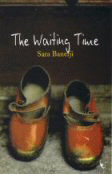Book Review: Sara Banerji's The Waiting Time
by anna battista

Though recently established, Oxford-based publishing company Transita has already received very positive feedback. Perhaps it’s because of its aim: publishing books by mature women, but most probably it’s because of the quality of the titles it has published so far, among them Sara Banerji’s The Waiting Time.
When the story starts, main character Julia is desperately trying to remember where she lived as a child. Her childhood was literally destroyed by a bomb that shattered her house, killed her parents and caused the separation from her brother Jem, who was adopted soon after the tragic event, while she was sent to Africa to be adopted there.
Julia remembers that her mum buried in their garden a box with some important documents: if she finds it she will perhaps manage to discover what’s her real surname, a thing that might help her tracking down her lost brother. Julia’s researches eventually lead her to the very spot where her family house was located and where the box was buried, but, on part of that land where her house was, now there is a cottage where a young couple, Kitty and Matt live.
The lives of Julia and Kitty collide when Matt is kidnapped and Julia secures his release. But things get even more complicated when Matt comes home, an old love of Julia, Dick, reappears on the scene and she realises her brother is nearer than she ever thought.
The book is not only about human relationships, war and its effects on individuals, it’s most of all about “the lost children of the empire”. The backdrop of Banerji’s novel is indeed child migration: between the end of the 1800 and the late 1960’s, Great Britain sent thousands of children away to its colonies where they could have been adopted. Everything started as a scheme to help children in need, but since the plan soon became too expensive, the man behind it, Thomas John Barnardo decided to send them to various British colonies to be adopted by families there. In The Waiting Time, the war separates Julia by her parents, but it’s a sort of conspiracy woven by various adults that sends her from an orphanage to Africa, severing all the bonds with her native land and with her identity. The trauma stays with Julia throughout her life and prevents her from starting a family, building up relationships and, generally, leading a normal life.
The story is fascinating, though the parts in which Julia remembers her childhood through her diary are the best ones, while the parts that narrate the vicissitudes of the friendship between Julia and Kitty, or Matt’s comeback are at times less exciting and rather painful, and the discovery of the truth about Jem and Dick’s sudden appearance constitute a sort of dei ex machina that resolve the plot and help Julia live happily ever after.
The Waiting Time explores the lives of the main characters in different settings and backgrounds, from Great Britain to Africa, in a way reflecting the author’s personal experiences. Born in 1932, Banerji emigrated with her family to Southern Rhodesia after the war, it was actually on the ship to Africa that Banerji met a group of “lost children”. Later on Banerji moved with her husband to India and went back to England in 1973.
In The Waiting Time, Banerji - who is also the author of seven other novels and a teacher of creative writing at Oxford University – examines the difficulties people meet while digging up in their personal past and unveils a universal truth: it’s only the strongest and bravest who manage to confront their past and when they do so, they usually find not only disappointment and sadness, but also love and happiness.
Copyright (c) 2005 erasing clouds |
|